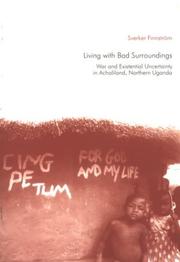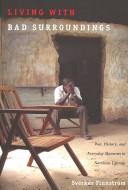| Listing 1 - 10 of 10 |
Sort by
|

ISBN: 9155457479 Year: 2003 Publisher: Uppsala University Library
Abstract | Keywords | Export | Availability | Bookmark
 Loading...
Loading...Choose an application
- Reference Manager
- EndNote
- RefWorks (Direct export to RefWorks)
Polemology --- Uganda --- #SBIB:328H419 --- #SBIB:327.5H21 --- #SBIB:327.6H01 --- #SBIB:39A73 --- Instellingen en beleid: andere Afrikaanse landen --- Vrede – oorlog, oorlogssituaties --- Internationale en diplomatieke relaties: specifieke conflicten --- Etnografie: Afrika --- Theses --- Acholi (African people) --- Acoli (African people) --- Ethnology --- Lwoo (African people) --- Nilotic peoples --- Social conditions --- Ouganda --- Politique et gouvernement

ISBN: 9780822341741 0822341743 9780822341918 0822341913 0822388790 128302263X 9786613022639 Year: 2008 Publisher: Durham, N.C. Duke University Press
Abstract | Keywords | Export | Availability | Bookmark
 Loading...
Loading...Choose an application
- Reference Manager
- EndNote
- RefWorks (Direct export to RefWorks)
Acholi (African people) --- Acoli (African people) --- War and society --- Social life and customs. --- Polemology --- Uganda
Dissertation
ISBN: 9789151302584 9151302586 Year: 2018 Publisher: Uppsala Uppsala Universitet
Abstract | Keywords | Export | Availability | Bookmark
 Loading...
Loading...Choose an application
- Reference Manager
- EndNote
- RefWorks (Direct export to RefWorks)
Based on ethnographic data gathered over a period of almost three years, this dissertation scrutinizes the everyday lives of informal workers selling auto parts in Kisekka Market, central Kampala. Its ambition is to understand how the workers navigated a highly moralized environment in today’s Uganda, where the supposed moral deterioration of society is passionately discussed in public and in private.Analytically the dissertation focuses on three “moral landscapes,” or moral discourses of different geographical scales, that intersected in the workers’ lives: first, the Ugandan nation or the country; second, the Buganda kingdom with its cultural institutions to which the majority of the workers professed allegiance; and third, the capital city Kampala. Materializing in Kisekka Market, each landscape posed moral demands that the workers navigated daily as they struggled to balance norms with lived practices.The workers were perceived by external observers as morally ambiguous for their supposed instrumentality in riots and violent crimes in Kampala. Their notoriousness increased for the fact that they were men, often uneducated, and therefore, in public discourse, potentially threatening. Consequently, they were referred to as bayaaye, translated as hooligans or bad guys, and this label defined their relations with customers from all parts of Kampala and Uganda.In exploring the implications of the three moral landscapes, particular attention is paid to the in-between. Rather than focusing on mediatized events like riots and crimes, the dissertation investigates and locates the workers’ agency in the mundane processes of care and getting by and the tentative paths to a good life that unfolded daily in Kisekka Market, regardless of larger political tensions in Kampala and beyond. The city’s development plan to replace Kisekka Market with a fancy shopping mall rendered the workers’ situation increasingly exposed and their lives increasingly vulnerable. In the workers’ quest for some degree of control and self-worth, the label of bayaaye refracted into its multiple dimensions – proudly appropriated or painfully rejected by the workers themselves – attesting to the complexities of everyday ethics, in Kampala as elsewhere. Consequently, the ethnography of this dissertation problematizes the dominant yet fraught narrative around young men in urban Africa.
Book
ISBN: 0822354357 0822354470 082237904X 1299532764 Year: 2013 Publisher: Duke University Press
Abstract | Keywords | Export | Availability | Bookmark
 Loading...
Loading...Choose an application
- Reference Manager
- EndNote
- RefWorks (Direct export to RefWorks)
Book

ISBN: 9780857455871 9780857455888 Year: 2011 Publisher: New York Oxford
Abstract | Keywords | Export | Availability | Bookmark
 Loading...
Loading...Choose an application
- Reference Manager
- EndNote
- RefWorks (Direct export to RefWorks)
War and society. --- War and civilization. --- War --- Technology --- Guerre et société --- Guerre et civilisation --- Guerre --- Technologie --- Technological innovations. --- Anthropological aspects. --- Innovations --- Aspect anthropologique --- War and civilization --- War and society --- #SBIB:327.5H21 --- #SBIB:39A4 --- Armed conflict (War) --- Conflict, Armed (War) --- Fighting --- Hostilities --- Wars --- International relations --- Military art and science --- Society and war --- Sociology --- Civilians in war --- Sociology, Military --- Civilization and war --- Civilization --- Anthropology --- Anthropological aspects --- Technological innovations --- Vrede – oorlog, oorlogssituaties --- Toegepaste antropologie --- Social aspects
Book

ISBN: 9781845459093 Year: 2009 Publisher: New York Oxford
Abstract | Keywords | Export | Availability | Bookmark
 Loading...
Loading...Choose an application
- Reference Manager
- EndNote
- RefWorks (Direct export to RefWorks)
Digital

ISBN: 9780857455888 Year: 2011 Publisher: New York; ; Oxford Berghahn Books
Abstract | Keywords | Export | Availability | Bookmark
 Loading...
Loading...Choose an application
- Reference Manager
- EndNote
- RefWorks (Direct export to RefWorks)
Multi

ISBN: 9781845459093 Year: 2009 Publisher: New York; ; Oxford Berghahn Books
Abstract | Keywords | Export | Availability | Bookmark
 Loading...
Loading...Choose an application
- Reference Manager
- EndNote
- RefWorks (Direct export to RefWorks)
Book

ISBN: 9781785330193 Year: 2016 Publisher: New York Oxford
Abstract | Keywords | Export | Availability | Bookmark
 Loading...
Loading...Choose an application
- Reference Manager
- EndNote
- RefWorks (Direct export to RefWorks)
Multi

ISBN: 9781785330193 Year: 2016 Publisher: New York; ; Oxford Berghahn Books
Abstract | Keywords | Export | Availability | Bookmark
 Loading...
Loading...Choose an application
- Reference Manager
- EndNote
- RefWorks (Direct export to RefWorks)
| Listing 1 - 10 of 10 |
Sort by
|

 Search
Search Feedback
Feedback About UniCat
About UniCat  Help
Help News
News